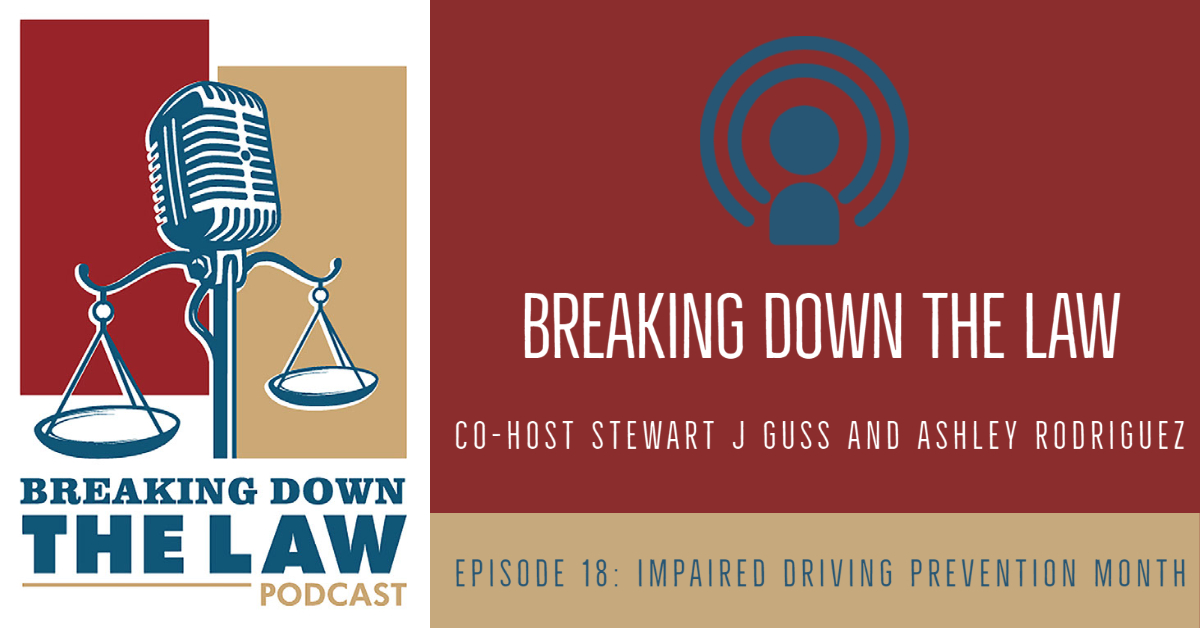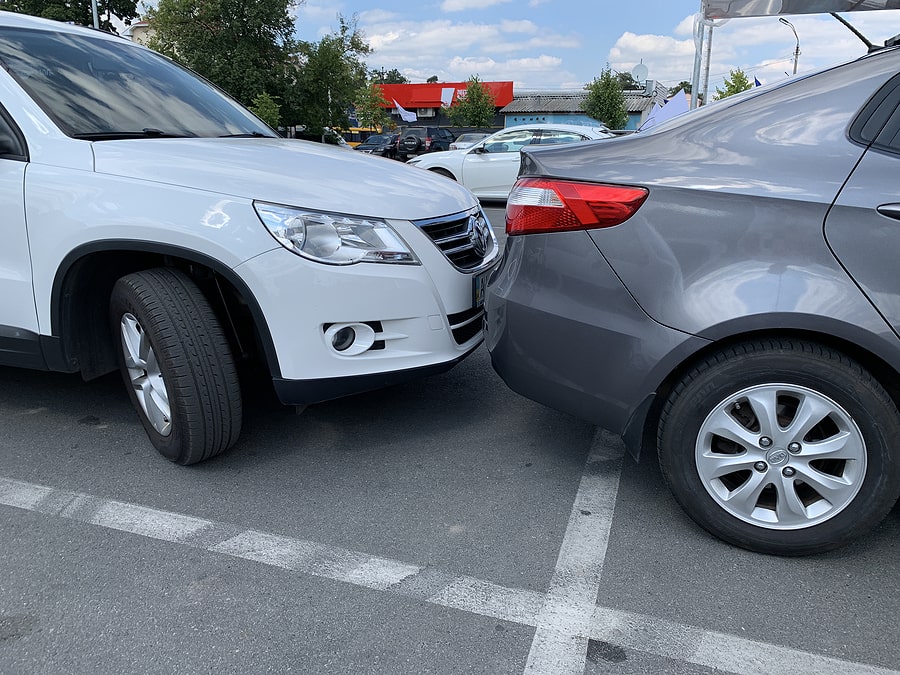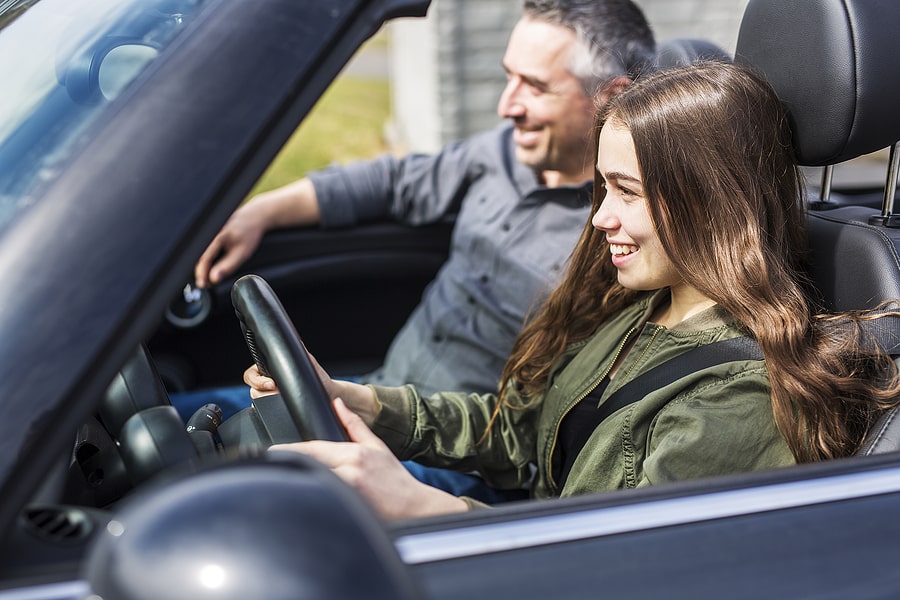For this episode of the Breaking Down The Law Podcast we’re joined by Brantley Sasseen. He is joined by Breaking Down The Law Podcast host, Ashley Rodriguez.
During today’s episode we will be asking Brantley about Impaired Driving and how we can prevent it and what are the consequences of driving drunk.
- Brantley shares his personal experience with Drunk Driving.
- Is drunk driving a felony?
- How many people die per year from drunk driving?
- How do we hold people accountable for drunk driving?
- When did drunk driving become illegal?
- How do you prevent drunk driving?
- How do you stop someone from drunk driving?
- What are some of the dangers of drunk driving?
- What if someone is drunk driving and they get in an accident and they cause a wrongful death?
Brantley shares about his experience with an impaired driver and why he is so passionate about prevention and helping others with the same experience as him. So we hope you’ll join us for this episode!
Stay tuned for the next installment of the Breaking Down The Law Podcast with Stewart J Guss and Ashley Rodriguez!
If you want to subscribe to our podcasts on your favorite podcasts player click here for all the links to each one!
Transcript [This transcript was created using an automated transcription service and may contain errors]
Intro:
Breaking down the law a podcast hosted by attorneys and legal specialists discussing everyday law and how it affects regular people. Let’s break down the law with our host, Stewart Guss and Ashley Rodriguez. They have the inside scoop on everything legal and newsworthy.
Ashley Rodriguez:
Welcome to breaking down the law. And I’m Ashley and today we are joined by
Brantley Sasseen:
hey i am Brantley Sasseen.
Ashley Rodriguez:
Brantley Really what do you do here?
Brantley Sasseen:
I am a senior executive attorney here with the firm.
Ashley Rodriguez:
Awesome. This month is National Impaired Driving Prevention Month. Drunk Driving has ruined many lives. And today’s topic is very important to our guest. Brantley, can you tell us how drunk driving has impacted your life?
Brantley Sasseen:
Yeah, so when I was a junior in high school some years ago, my grandfather actually was killed in a car wreck that involves a driver who was impaired, both drunk and apparently on some other substances back at the time. And certainly, every time I think about it, it recalls many memories. But I just remember the the shock that was involved, because it’s just something that’s so unexpected. And then of course, just the turmoil and really the torment that inflicts upon the entire family when you have something like that occur. So even though it’s been really many years, since that happened, it’s still very fresh every time I recall the memory just because it makes such a lasting impact.
Ashley Rodriguez:
Yeah, it’s just that unexpected thing like, No one expects to get that phone call.
Brantley Sasseen:
Right?
Ashley Rodriguez:
So is drunk driving a felony?
Brantley Sasseen:
Yeah, it’s a interesting question. The rules vary by state, first of all, is probably the most important thing for me to mention. I am licensed here in Texas. And so I can comment a bit more aptly upon how it works here in Texas. But the laws of the rules tend to be somewhat similar across states, they just have some variations. So it’s actually usually a misdemeanor, believe it or not, in most states, it is in Texas. However, there are many things that can escalate a normal drunk driving charge to a felony charge. And that’s probably not something that most people would expect. It requires a little bit of legal knowledge. But probably the most common example is having a prior drunk driving conviction. So if you have prior DUIs or DWI, that can escalate a subsequent charge to a felony one. Other examples would include injuring someone while drunk driving back and increase the charge to a felony level, just being an arrest or causing property damage if you’re drunk while driving can increase the charge to a felony breaking other laws at the same time. So for example, if you don’t have a valid driver’s license, and you’re driving drunk, that can enhance the charge and increase it to a felony level. Having a child in the vehicle, you know, can increase it to where you’re getting a child endangerment charge, in addition to the drunk driving charge. And then in some states, even just having an excessively high blood alcohol content can enhance that charge from a misdemeanor up to a felony. The other thing that I would mention in that context is we tend to have this cognitive dissonance about Oh, a misdemeanor is not as severe, and a felony is more severe. But even for a misdemeanor, there are different levels of misdemeanors and the charges and the penalties for those charges can still be quite severe. The best example I can give of that is that in Texas, a drunk driving conviction is one of the only things that can never be expunged, never be non disclosed and never be taken off your record, it will be there forever. And there’s nothing that you can do about it, the best attorney in the world can get it off because the law says that it stays there. So while the time spent in jail, or the fines or the community service, or whatever they impose may not be as severe as for me with things that are traditional felonies, it falls into a special category and that some of those things can be taken off your record, once you’ve fulfilled your sentence, whereas drunk driving cannot get will be there forever. And again, that’s true in Texas, maybe not in other states. But that’s an important thing to keep in mind. Just because it’s a misdemeanor doesn’t mean that it doesn’t carry very serious penalties with it.
Ashley Rodriguez:
So how many people do you think die per year from drunk driving?
Brantley Sasseen:
So about 25% of all traffic related deaths are because of drunk driving. That’s pretty high, about 30 people per day died because of drunk driving incidents across the United States. So pretty significant number. Texas, specifically in recent years has the highest number, highest hard number of drunk driving fatalities involved in 2018. There were about 10,000 drunk driving deaths reported As many as a third of all traffic related deaths are because of drunk driving. So a very significant number.
Ashley Rodriguez:
How do we hold people accountable or is like the people serving I mean, how’s the laws with drunk driving and being served?
Brantley Sasseen:
Yeah. So again, it varies by state. And I can speak mostly to Texas. But certainly, if someone who is drunk driving causes a wreck, you’re going to look to them and their insurance primarily. But of course, wrecks involving drunk drivers are, are usually the worst wrecks that we see, have a much higher rate of fatalities are at the very least severe injury. Because the person is impaired, they’re not thinking about what speed they’re going or how they’re driving, I mean, they can become an on the wrong side of the road and hit your head on, which is not something that you see perhaps in a non drunk driving type crash on average, but they may only have very minimal insurance as compared to the injuries that you’ve suffered and the medical bills that you may acquire as a result of having to have treatment for your injuries, they may have no insurance, someone who’s irresponsible enough to get out on the road and drive drunk, may very well also be the same type of person who’s irresponsible enough to not have the type of insurance that they’re required to have. So you may be staring down the barrel of nothing on the other side. Certainly, you may have provisions or coverages on your own insurance policy that can help to cover you and those kinds of situations, I would highly encourage anyone who is not sure or does not have things like uninsured motorist insurance, to contact your insurance sales agent or adjuster have those coverages added, they are not super expensive. They’re not anywhere near the cost of something like full coverage or common collision. But I think a lot of people hear that terms full coverage, and they say, Oh, I have full coverage. And they think that means they have uninsured motorist coverage, but they actually don’t. So it can be as little as you know, five to $10 a month for a pretty significant amount of coverage. So I would certainly encourage anybody to make sure they have those types of coverages. Other than that, you can sometimes make a claim against a bar or restaurant or a business that has over served someone. But the requirements to prove that type of claim. And in Texas, that’s called a DRAM shop claim can actually be pretty difficult. You have to be able to prove that that business knew when they started or they began to over serve that person that they were already in the breeding. And sometimes being able to gather the evidence to prove that can be pretty difficult if you don’t have video evidence, or they hadn’t been at that bar for a particular long time. And you can’t show by virtue of receipts or charges, you know, on a car, they are being overserved. Then sometimes even if you even if everyone, I highly suspect that that may have been the case. Unfortunately, if you’re going to court to try to prove something like that the level the standard of proof is not just what do we suspect it’s what can we actually demonstrate. So those claims are possible, but they can be difficult as well.
Ashley Rodriguez:
So when did drunk driving become illegal?
Brantley Sasseen:
There’s not a hard and fast answer to that question. I did a little bit of research on it. And at least historically, what I was able to find is that some of the first laws go back as far as like 1910. In some states, I think New York was one of the first states that had some sort of law on the books that made drunk driving illegal. public awareness about drunk driving really started to increase in the late 1970s, early 1980s. And 1980 saw the advent of MADD, Mothers Against Drunk Driving, which did really a lot to increase public awareness about drunk driving. Penalties started to become harsher around that same time that the early 80s, late 70s. The federal minimum drinking age, for example, was raised to 21 years old in 1984. So it was really that time period where you started to see a lot of public awareness about it and legislative efforts coinciding with that.
Ashley Rodriguez:
So how do you prevent drunk driving?
Brantley Sasseen:
There are, I think, a lot of things that you can consider. And it’s situation, there’s no great answer to it. At the end of the day, I think someone has to be motivated themselves not to engage in the behavior. But certainly, if you are planning on going out and doing some drinking, making sure that you have a designated driver, it should be number one on anybody’s list. If you are going out with friends, and y’all are going to be drinking certainly make sure that you’re looking out for your friends, because there are state of mind or the type of, you know, mindset that they might have about driving when they’re not integrated can quickly change once they are and so being aware and making sure that you’re keeping an eye out if you are going to be drinking with other folks I think is a good mindset to have about it. It is certainly easier than ever to simply not drive if you’re going to be drinking Uber and Lyft and most places I think now are pretty ever present and really a much less expensive. And save option, then the penalties associated with drunk driving the average cost just for attorneys and court fees and everything else not to mention the time and the shame involved. For a drunk driving conviction is as much as $10,000
Ashley Rodriguez:
you could lose your job to so you really
Brantley Sasseen:
lose your job, all sorts of things. Again, like I mentioned, it stays on your record permanently. So it can make finding jobs in the future more difficult, you know, a 20 or $30, Uber, even if it’s both ways, a whole lot less expensive than 10 grand plus all of the other things combined. So make sure you have those apps installed on your phone, parents, of course, talk to your kids, make sure that you’ve had those conversations, just because they’re not of the legal age doesn’t mean that they may not be out there and tempted to engage in some of those behaviors, as mad as you may be that they would have engaged in some of those behaviors, making sure that they feel comfortable enough to call you if they have and you know, aren’t able to drive is a whole lot better than having them take the risk because they’re worried about making you upset. So I think having that conversation is important if you’ve got kids, and there’s a lot of resources out there that can help with that.
Ashley Rodriguez:
So do you have any advice how to stop someone from drunk driving? Like if you realize they shouldn’t be driving? What can you do?
Brantley Sasseen:
Yeah, first and foremost, and you could probably guess it take their keys, you know, just stop them from actually having the physical ability to drive offered to drive for them. If you’re able to if you’re not an abraded call an Uber call Lyft you know, call all these ride sharing services and get them a ride. Oftentimes, you may find that this is a pattern of behavior, it’s not the first time that someone is engaged, but maybe they they separately have a problem just in general, with alcohol consumption, it may be something where one time intervention source taking their keys or stopping in that instant is not going to stop the possibility in the future. So if you notice those patterns, behaviors, certainly consider at the very least finding someone close to them they trust, you know, a parent, spouse, friend, priest, Pastor, coworker, really whoever they may be comfortable with, and trying to make sure that there’s some sort of plan in place to hopefully address, you know, a longer pattern of behavior with someone who may be more prone to engaging in drunk driving. I think the best thing that I could say, in that context is just to make sure that it’s always coming from a place of caring and love, to the extent you’re just trying to, you know, smack the hammer down, that they’re probably going to be more likely to resist that they’re more likely to run in the opposite direction. So just reiterating that. And it may be a better question for a psychologist and an attorney to be honest about it, because they may have more insight into the mindset of someone. But again, my opinion is that really the only way to stop someone from engaging that type of behavior, or who may have a problem is for them to want to stop that themselves. So
Ashley Rodriguez:
So what are some of the dangers of driving drunk?
Brantley Sasseen:
We already talked about some of them, certainly, criminal penalties are the biggest one, at a minimum, you know, getting arrested, spending some time in jail, being punished by a judge for engaging in the behavior. And that can range again, from jail time to find to community service, or probation, or generally a combination of all of those things, all of the above. At worst, it’s hurting yourself, and someone else, other people, oftentimes, as we’ve seen, it results in death. You’re not just hurting yourself, you’re not just hurting that person who dies, you are really inflicting a lifetime of change and pain upon the families and the friends and everybody who’s involved, just turns the world of all of those people who are involved, so completely upside down because of a small alterable decision. And that’s, in my opinion, certainly the biggest danger.
Ashley Rodriguez:
Yeah, they’re changing all those people’s lives when you could have just taken an uber. Exactly. So what if someone is drunk driving and they get in an accident and they cause a wrongful death? What happens then? Is their punishment more? And also, how does that family then handle that situation? If they’re on the receiving end, and somebody has killed their family member?
Brantley Sasseen:
Yes. So it almost invariably is a different charge. If you are drunk driving and you kill someone in Texas, at the very least just even injuring someone can result in a charge known as intoxication assault. If you kill someone, that’s likely intoxication manslaughter, you’re talking felony level and the penalties are much more severe, and you’re most likely looking at jail time, significant jail time for something like that. juries and judges and folks here in Texas do not look kindly upon those kinds of situations and with good reason. So the penalties for that person who actually engaged in the drunk driving are much more severe. If you’re on the unfortunate receiving and the other side of it. I would say that the best thing you can do is to get an attorney probably involved as quickly as possible. sooner than later. In addition to just sort of what we think of as the personal injury side of making the wrongful death claim, there are some other considerations. So one is that at least in Texas, the Attorney General for the state has a crime victims compensation program. Oftentimes, if you’re dealing with someone who was not insured at all, who caused the drunk driving wreck, or maybe did not have sufficient insurance, it may be a situation where you need to look to other sources to try to find some sort of compensation. And also, those sources, like the crime victims compensation program may be able to provide a little bit more immediate relief, to help deal with some of those unfortunate costs that are invariably going to arise in terms of final expenses and funeral arrangements and the like.
Ashley Rodriguez:
So if you aren’t expecting those
Brantley Sasseen:
right out of the blue, exactly, and having an attorney involved can help facilitate that process. There are also some other potential sources of recovery, as we talked about exploring a DRAM shop claim against a business or a bar or place that may have over served this person. The sooner that we are involved, the sooner we can start to do an investigation, the sooner we can put potential defendants on notice to preserve evidence, that’s our biggest worry in any situation like that is, the longer it goes on. without some sort of investigation, the higher the chances that evidence, critical evidence may not be preserved. But in videos, videos, receipts, bank records, just records at you know, the actual business that served them, tracking down witnesses who may have been there, or who may have seen something, the sooner we get involved, the sooner we can at least start looking into some of those things. And while it’s probably the last thing, and I speak from experience on that, that anyone who is dealing with the grief associated with the loss of loved one wants to deal with, it’s all the more critical in a situation like that, unfortunately. And while it’s not fun to perhaps get it set up, the truth is hopefully it can help alleviate some of the burden of having to them, think about those things and deal with those things yourself or even just trying to deal with some of those things yourself, we can help take some of that burden off and and make sure that you know we’re doing the legwork on that. And that way anyone who’s having to deal with some of the other issues and the grief associated can focus on that while we take care of the heavy lifting on the other side.
Ashley Rodriguez:
Yeah, so someone else can take care of that way they can just grive their loved one
Brantley Sasseen:
and of course in a situation like that with major injuries or death, we’re going to be looking at every angle, we can as well, you would be surprised that sometimes there are creative ways to find other sources of recovery. In those situations, we’re going to look for example, if you have a vehicle, maybe that had a defect, and that could be a potential products liability claim, in addition to all of the other claims that could be involved. Again, having an attorney put eyes on things and just make sure that evidence is preserved as quickly as possible. It’s probably the best thing that you can do for yourself and your family. There are other factors such as how do you handle for example, the probate or the estate side of things? that’s often a critical question. And while it’s not something that we handled directly, we have some great attorneys that we work with who handle that type of law. And we can at the very least, steer someone in the right direction, in terms of thinking about how some of those things may need to ultimately be accounted for as well.
Ashley Rodriguez:
Yeah, the end of the day, like that’s a lot to deal with,
Brantley Sasseen:
especially all at once, right. And it’s the last thing that you want to deal with as well. You want to focus on your own personal healing, and trying to move through, you know, those processes. Last thing you want to think about is claims and probate and all this legal business. And the easiest way that you can deal with that is to get an attorney to take care of that for you.
Ashley Rodriguez:
The ultimate message here is to just take an Uber or Lyft because you’re acting way more people than you can even imagine, including yourself because you would live with that guilt.
Brantley Sasseen:
Yeah, if I could distill the message down as simply as possible, it would just be it’s not worth it. It’s just not worth it. It’s a huge risk for a small cost on the front end to prevent it.
Ashley Rodriguez:
Well, thank you for breaking down below with us today. And if you are a family member have been affected by a drunk driver give us a call for your free case evaluation at 281-783-3934





